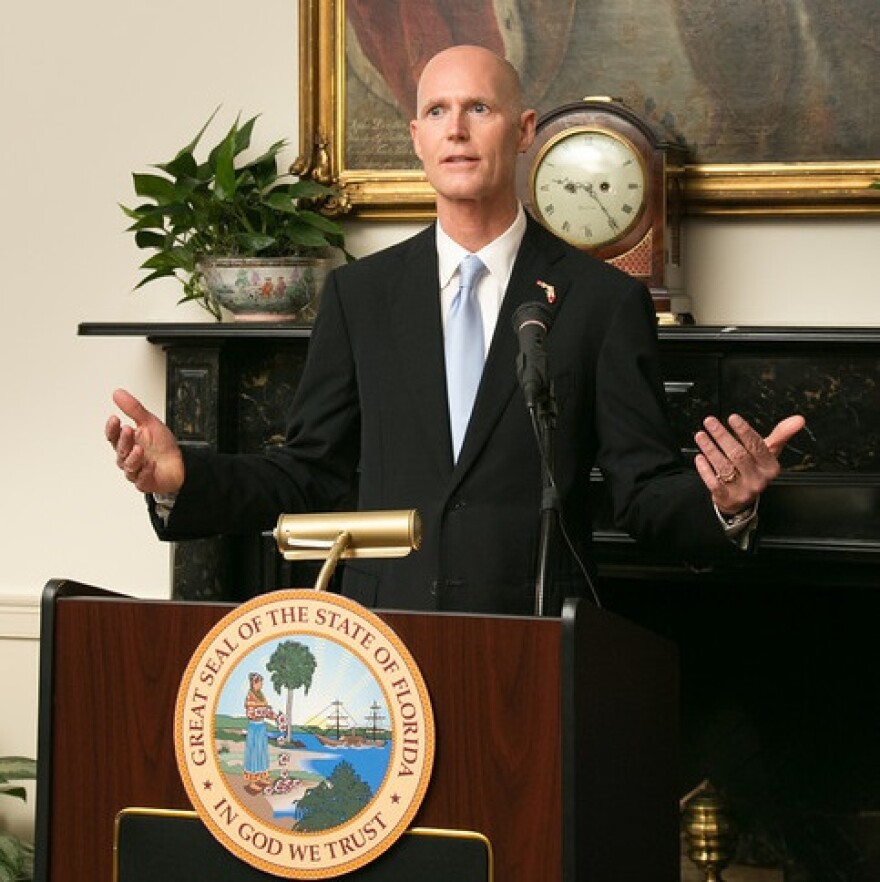In a new sign of escalating tensions between state and federal officials, Gov. Rick Scott announced Thursday he will sue the federal government to try to resolve a standoff over $2.2 billion in funding for hospitals and other health providers.
But even lawmakers who support Scott's move said any court decision would come too late to resolve a budget impasse that has made it a near-certainty that the Legislature won't finish a spending plan --- its one constitutionally required responsibility --- before the annual session's scheduled May 1 conclusion. If so, it would mark the first time lawmakers have gone into overtime on the budget since 2009.
Scott's lawsuit would rely on a potentially novel interpretation of the 2012 U.S. Supreme Court ruling that upheld the federal Affordable Care Act, popularly known as Obamacare. In that case, NFIB v. Sebelius, the court ruled that the federal government couldn't coerce states into expanding Medicaid by requiring any state that didn't do so to give up all of its Medicaid funding.
The governor's legal action would argue that the federal Centers for Medicare & Medicaid Services is doing the same thing by linking an extension of the Low Income Pool, or LIP, program to whether the state expands Medicaid coverage. LIP, which provides money to hospitals and other health providers that serve large numbers of poor and uninsured patients, is set to expire June 30.
"Our citizens already pay federal taxes that go into the federal LIP program," Scott said in a statement announcing the action. "Now, President Obama has decided that the state must take on a larger Medicaid program, forcing our taxpayers to pay even more to government, before they get their own federal tax dollars back. This is outrageous, and specifically what the Supreme Court warned against."
Advocates and hospitals have said that if the state loses LIP funding, it could cause cutbacks in services or programs across the state.
Speaking to reporters after the announcement, Lt. Gov. Carlos Lopez-Cantera said Scott's administration was doing whatever is necessary to try to get LIP funds for Florida.
"We need to explore every option to ensure that these funds are available for the most needy here in Florida," Lopez-Cantera said. "That's what Gov. Scott's always done. He's always fought for Floridians, and that's what he's doing with this."
The lawsuit plays into a heated battle over a Senate plan to use $2.8 billion in Medicaid expansion funding to help lower-income Floridians purchase private health insurance. But the House and Scott --- who once favored straight-up Medicaid expansion --- oppose that idea. House leaders say the federal government wouldn't approve it even if they agreed to go along.
Senate President Andy Gardiner, R-Orlando, said he's skeptical that the lawsuit will free up LIP dollars before the new budget year begins July 1.
"Certainly, the governor has his opinion and has put forward kind of a new little wrinkle today, but I'm not sure that that solves the situation that we're in where we have to have a balanced budget, and we have to make some decisions," Gardiner said.
Any case could take weeks to be heard, and any initial ruling could spend months winding its way through the appeals process. House Speaker Steve Crisafulli, a Merritt Island Republican who backed Scott's lawsuit, also said legal action wouldn't have a practical impact on the immediate budget problem.
"No, most likely, it won't," he said. "The only thing that will have an effect on the budget from the standpoint of LIP and CMS is if Washington does something."
Asked about the lawsuit, a spokesman for CMS said the state could do what it wanted with Medicaid, but referred back to a letter in which the agency said "the state's expansion status is an important consideration in our approach regarding extending the LIP beyond June."
That letter outraged some state officials and eventually led to Scott's lawsuit.
"Florida, like all states, is free to implement Medicaid expansion or not. ... We look forward to the state submitting its LIP proposal and CMS will review it based on the principles articulated in our April 14 letter," spokesman Aaron Albright said in an email.
Democrats, meanwhile, blasted the governor for an act that they said wouldn't solve the problem and would lead to the state being tied up in costly litigation. Scott, whose foray into politics began with a fierce ad war against Obamacare before seeking the governor's office, has frequently battled the federal government in court.
"It's more of the same from the governor," said House Minority Leader Mark Pafford, D-West Palm Beach. "It's a corporate reaction: We sue people. The sad part is, it's the taxpayers of Florida that will pay more."
Senate Minority Leader Arthenia Joyner, D-Tampa, accused Scott of hypocrisy for pushing for LIP dollars from the federal government while rejecting expansion money from the same source.
"Today's grandstanding underscores his commitment to wasting Florida's tax dollars to get what he wants, at whatever cost," Joyner said in a statement issued by her office. "This is all about scoring points against President Obama."
At the same time, Crisafulli signaled a willingness to use state money to try to shield hospitals from the effects of lost LIP funding. The speaker has said before that he would not use state dollars to "backfill" the LIP system, but drew a distinction Thursday between that and setting up a state program.
"If we want to talk about a plan moving forward, we can talk about a plan moving forward from the standpoint of trying to help those safety-net hospitals with a different kind of program," he said. "But for us to take up and put a pot of money out there that they get to draw from like they do right now with LIP is not something that we could possibly do in Tallahassee with even the greatest of budget reserves."




